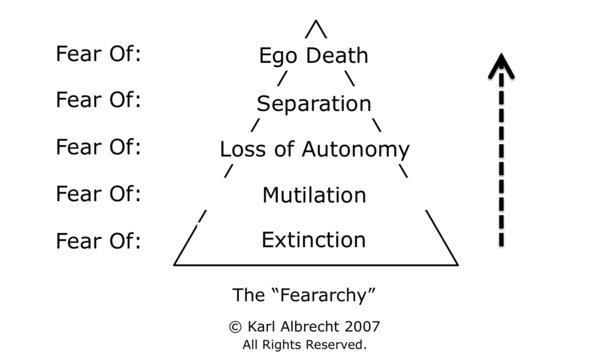“Feararchy” – The Hierarchy of Fear
By Marina Zayats
August 26, 2014 • Fact checked by Dumb Little Man

“I learned that courage was not the absence of fear, but the triumph over it.” ~Nelson Mandela
An often used definition of fear is: An anxious feeling, caused by our anticipation of some imagined event or experience.
Although there is a wide spectrum of things people fear – death of a loved one, Heights,Darkness, rejection from the opposite sex, injury from a car crash , embarrassment during a presentation, failure at the job- almost all of our fears are manufactured from these 5 basic fears, with #1 being the most natural one and #5 more of a socially constructed idea!
Extinction—the fear dying or “no longer being” arouses an existential anxiety in most healthy humans. Remember that fast heartbeat you get every time you look over the edge of a steep cliff.
Mutilation—the fear of losing any part of our bodily structure, like an organ, body part, or natural function. Anxiety about toxic spiders or car crashes arises from fear of mutilation.
Loss of Autonomy—the fear of being immobilized, paralyzed, restricted, imprisoned or otherwise controlled by circumstances or people beyond our control. In physical form, it’s commonly known as claustrophobia, but it also extends to our relationships (see toxic relationships or the loss of political or economical power for instance!)
Separation—the fear of abandonment, rejection, and loss of connectedness; of becoming rejected by society—not wanted, respected, or valued by anyone else. This feeling can have a devastating psychological effect on a person.
Ego-death—the fear of humiliation, shame, or any other sense of deep self-disapproval that threatens Self-integrity. It can undermine one’s feeling of the personal lovability, capability, and worthiness.
A Gallup Poll reveals the most common fears of teenagers in the US:
Terrorist attacks
Spiders
Death
Failure
War
Heights
Crime/Violence
Being alone
The future
Nuclear war
All of those top 10 fears have their roots in the 5 basic fears presented above and they can have tremendous limiting effects on us! Many people don’t change unsatisfying jobs, cities, circle of friends or partners because of fear! Fear of potential loss and failure weighs heavier than potential success! What causes fear and how can we reduce or even eliminate it? What would it mean for our life and the opportunities it would create?
The most interesting thing: While some of our fears have basic survival value, others are learned reflexes that can be weakened or re-learned.
Take jealousy for example: In most cases it can be tracked back to the fear of separation (my partner can leave me and I will feel lonely) and ego-death (she is liked more than me-is she better than me?). While this is a very common fear in our Western societies, it is a very unknown concept in many indigenous folks where open relationships are the rule rather than the exception and jealousy is an unknown construct. Also, research shows that certain fears are specific to some countries and cultures. In Japan, the fear of offending someone else by an excess of modesty or showing respect is a very common fear that seems to be Japan-specific since this fear is based on their unique cultural values.
Another interesting observation with fear: it can be taught, or “conditioned”. In an experiment, a small boy was conditioned to fear white rats, although intentionally the boy had no fear of the furry white creatures. Every time the boy would see a white rat, an unpleasant loud noise would be played and shocking the young boy. Not only learned the boy to fear white rats and start crying when he saw them, but also fear other furry animals and even Santa Clause with his white beard!
The question now is: if we can learn fear, can we also get rid of it? Yes, according to a study conducted by UCLS. It is called fear extinction! It works just as the conditioning, but the other way around. When people were exposed to their fear (for example snakes) but without the negative effect (poison and hurtful bites), peoples stressful reaction to snakes which causes fear, started to get weaker and weaker. The answer lies apparently in the task to separate the feared object from the root of its danger and the meaning of its cultural implication!
What does this mean for our example of jealousy? If the idea of open relationships for example, would be stripped off the basic fear of being alone and having their ego hurt, what would that mean for jealousy? Would it still exist and if yes, maybe to a smaller extent?
Another thing to keep in mind: Fear, like all other emotions, is basically information. It offers us knowledge and understanding of our psychobiological status, if we learn to accept it.By observing our fear and its roots, the more control we gain over our fears instead of letting it control us!
(c) 2007 Karl Albrecht. Used with permission.



